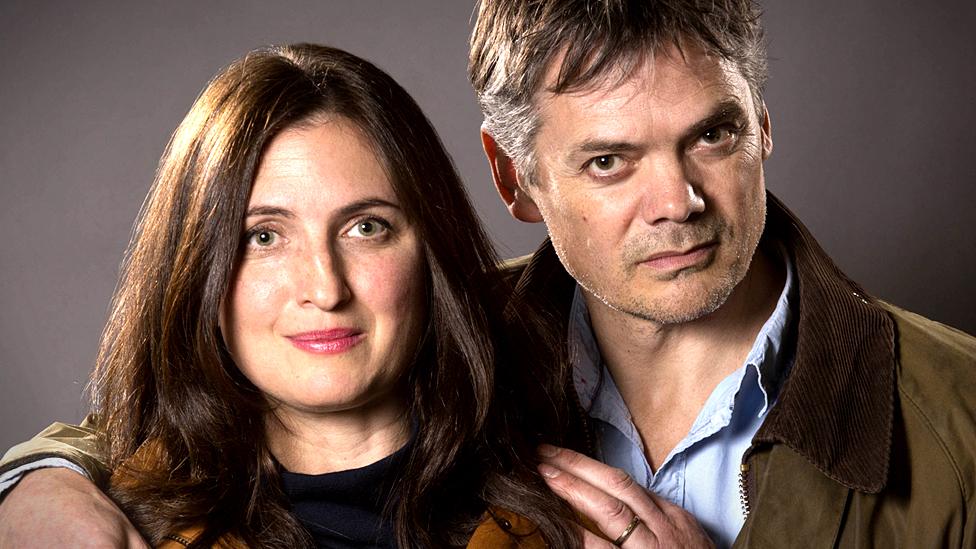Can TV soaps like EastEnders and Coronation Street really change lives?
- Published
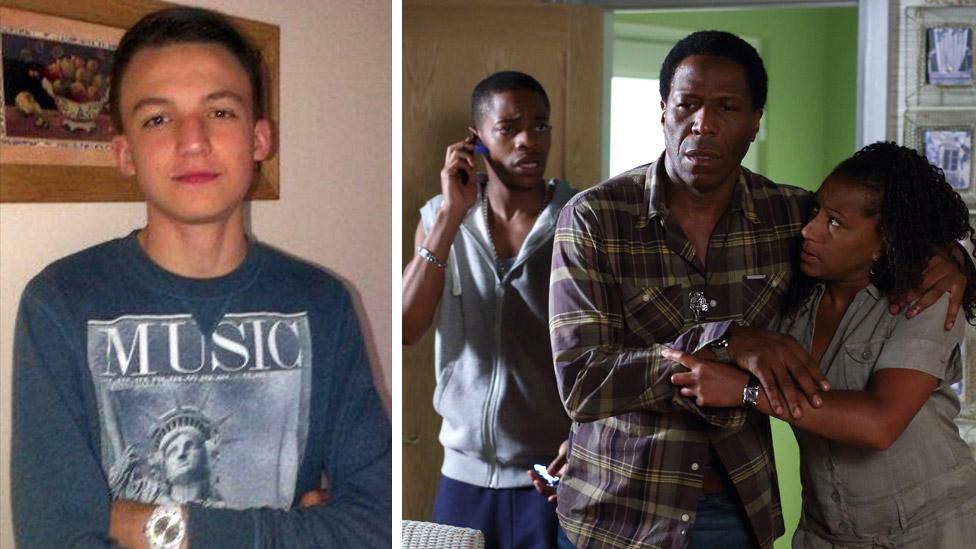
Cian Pace had watched an EastEnders storyline about kidney donation
One night in 2013, 18-year-old Cian Pace was watching EastEnders as usual, and saw an episode in which Dexter was donating a kidney to Sam. At home in Sheffield, Cian turned to his dad and made a casual remark, as you do.
Cian's mum Margaret Hitchcock recalls: "He said, 'Oh I would be an organ donor. The only thing is I wouldn't donate my heart, because that's my essence, and my eyes.
"And we laughed, and that was the end of it. We put it behind us because we didn't think that would ever happen."
But weeks later, just after his 19th birthday, Cian was travelling in a car that crashed. He died three days later.
"When he was in hospital on life support they said, 'Would you be interested in him being a donor?'" Mrs Hitchcock says. "And we both said, 'Yes we would.'
"If it hadn't been for watching EastEnders, we wouldn't have known that."
Cian's heart and eyes weren't donated, but other organs saved the lives of five people who needed transplants.
"One was a two-year-old boy, one was a 14-year-old girl, one was a man in his 30s, and one was an older man," Mrs Hitchcock says. "That little boy might then go on to have a family, that young girl now can go to university, and they have a life."
Some of those transplant recipients have written to Cian's mum. "When I get the letters, obviously it's bittersweet and it's very upsetting," she says. But she adds: "It lights me up because he's saved them.
"I felt very sad but I felt very proud that he didn't just go to waste. He saved five people's lives."
EastEnders' kidney donation storyline is one of many hard-hitting soap plots that have been designed to get people talking as well as to ramp up the on-screen drama.
And while realism is often sacrificed for ratings-hungry plot twists, Cian Pace's casual conversation demonstrates that messages from TV shows can make a difference in real life.
Soaps now routinely take advice from charities in an attempt to cover potentially tricky topics accurately and sensitively. The National Kidney Federation assisted the BBC in the Sam and Dexter kidney storyline.
Here, four other charities explain how they have worked with soaps, and what happens when TV shows get it right - and wrong.

Best way to get message across - Kidney Care UK
Fiona Loud, policy director at Kidney Care UK, says TV dramas get through to viewers better than any official campaign or news report.
"Soaps can reach those parts that public messages can't reach in the same way," she says.
"The most important conversations - having that chat with your family - are far more likely to happen in a casual way at home when you're sitting around, having a cup of tea or something, rather than the horrible and very rare situation where you could be dying and you could actually become a donor."

Loud advised Coronation Street on the storyline that saw Carla Connor, played by Alison King, have a transplant earlier this year.
"It was mainly me on a Sunday afternoon reading through the scripts and trying to amend them to make them realistic enough," she explains.
She was recruited after writing to producers to point out inaccuracies in a previous storyline. The Carla story was criticised by some who said she wouldn't have got a transplant as quickly as she did - but for Loud, those compromises were a price worth paying.
"I put forward quite a lot of suggestions about the timeline, but overall we just said it's better to have this beaming into people's living rooms to raise awareness of a condition that not that many people know about, and to get to patients who needed help and were able to get help from us."
And viewers did seek help, with record traffic to the charity's website, she says.
The programme was also thanked for raising awareness during a parliamentary debate in February about a proposed law on presumed consent, meaning people would be organ donors unless they opt out.
"At their best, soaps can play a huge part in helping to inform the public on such issues," Labour MP Sharon Hodgson told the House of Commons.
For support, visit Kidney Care UK, external or call 01420 541424

Risks and rewards - Samaritans
If soaps don't get it right, there can also be very real consequences.
Research shows that the way suicide is shown can inspire copycat attempts.
In 1999, a study showed that a Casualty storyline about a pilot who tried to kill himself led to increases in the numbers of people attempting to take their lives by the same method in the following two weeks.
"There's an awful lot of risk in covering this topic, so it's important that it's done in a way that is safe," according to Samaritans media advisor Lorna Fraser.

She advises programme-makers to take "particular care" when thinking about showing suicide methods.
She worked with Coronation Street on the storyline surrounding Aidan Connor earlier this year - which didn't show how he killed himself, and didn't show his body.
"They were very responsible," she says. "And in the aftermath, apart from showing the devastation caused to his loved ones and those around him, they also really focused in on the importance of talking."
As well as having risks, portraying suicide can encourage viewers to reach out if they can relate to a character's struggles, see the grief and devastation that's left behind, or see positive stories of recovery, she adds.
"Soaps have the power to engage with large audiences, and through compelling and engaging character storylines can touch those people and encourage them to reach out and seek help. For some, that can be a lifeline."
For support, visit Samaritans, external, call 116123 or email jo@samaritans.org, external

Viewers are future jurors - Rape Crisis

Ruby and Matt will have different versions of events on EastEnders
Next week, EastEnders viewers will see a storyline revolving around Ruby Allen, played by Louisa Lytton, being raped after a party.
It chimes in with the debates that have been taking place about consent in the wake of the #MeToo revelations over the past 12 months.
Producers have worked with Rape Crisis South London, whose chief executive Yvonne Traynor says they want to "dispel all the myths and stereotypes" surrounding sexual violence.
She says: "Soap operas are watched by so many people that they have a responsibility to get it right, to portray any situation in the correct way as opposed to the old days… what did they used to call it? Artistic licence."
Seeing characters go through their ordeals can prompt people to talk about - or report - their own experiences, Traynor says.
"It gives them a licence to actually look for help when they see that it's happening, and it can happen anywhere," she says. "And they don't feel so isolated, so they come forward.
"We run the National Rape Crisis Helpline and the calls escalate during the times that the programme's being aired. It's very, very clear.
"We opened the helpline when Broadchurch was showing the rape. They [ITV] actually commissioned us to open for longer hours, so we opened from early in the morning until midnight.
"And it was really busy from the moment we opened to the moment we closed. That's the immediate effect that these storylines have.
"The long-term effect we hope is that ordinary members of society really understand what sexual violence is. And those ordinary members of society are going to be on juries.
"So perhaps cases will go a different way and rather than a 54% conviction rate, that conviction rate will rise if people really understand and stop thinking that women who are drunk deserve to be raped, or it's their fault, or women who wear particular clothing [are at fault]."
For support, visit Rape Crisis, external or call the National Rape Crisis Helpline on 0808 802 9999

Psychiatrists get a lesson in EastEnders - Mind
In the past, portrayals of people with mental health conditions have sometimes given a damaging impression to viewers, according to Jenni Regan, media engagement at Mind.
"You'd see a character coming in for one episode and killing everybody and then it would turn out it was because of his schizophrenia or something," she says.
Regan now advises soaps and dramas on between 60-70 stories per year. Things are "getting a lot better", she believes.
An example of the power of soaps came in a 2014 study from campaign group Time To Change, external, which found that 31% of viewers who saw a character with mental health problems said it prompted them to start a conversation about the storyline with friends, family or colleagues.
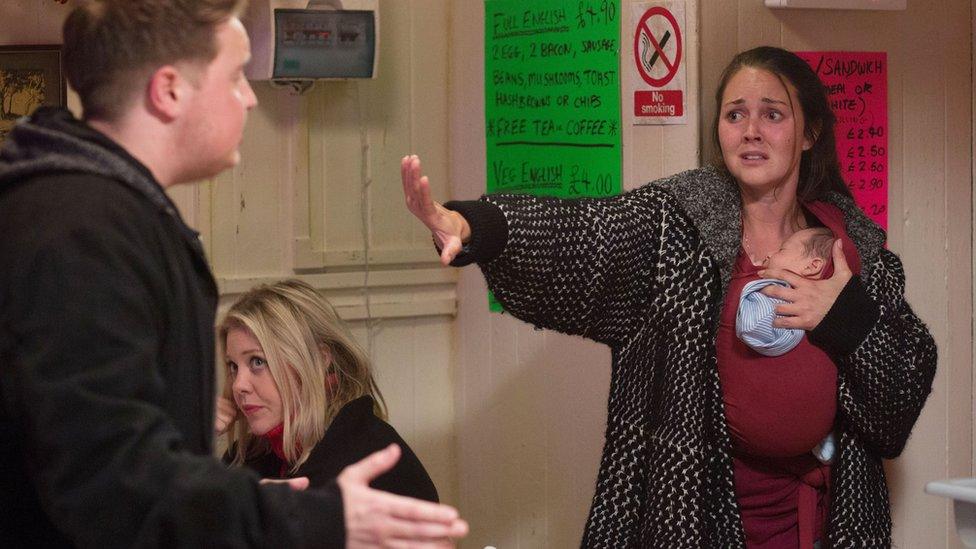
Regan has worked on stories including Stacey Branning's postpartum psychosis on EastEnders in 2016. Before those scripts were written, Regan took mothers with experience of the condition to meet actress Lacey Turner, the writers and producers.
Speaking about the public reaction, Regan says: "People were saying, 'Oh, my God, I recognise that was me - that happened to me after I had a baby.' That was huge and I think it's still having a big impact now.
"In fact, I went to a presentation at a psychiatrists' training conference and a lot of psychiatrists, when they're learning about postpartum psychosis, will actually use the EastEnders storyline.
"So it's gone full circle - the storyline was informed by real life, and now real life has been informed by that."
For support, visit Mind, external or call 0300 1233393

Follow us on Facebook, external, on Twitter @BBCNewsEnts, external, or on Instagram at bbcnewsents, external. If you have a story suggestion email entertainment.news@bbc.co.uk.
- Published4 September 2018
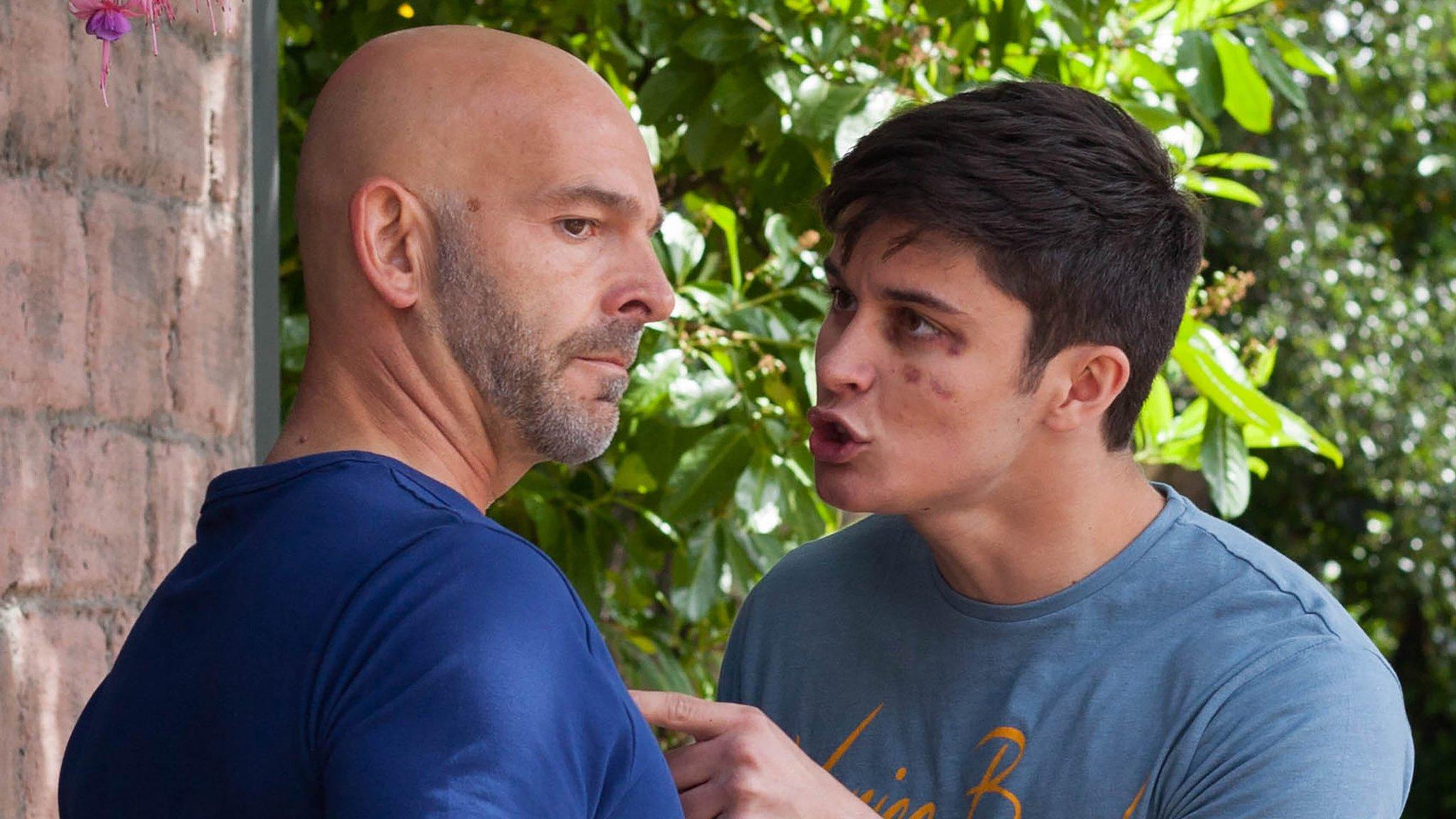
- Published7 July 2018
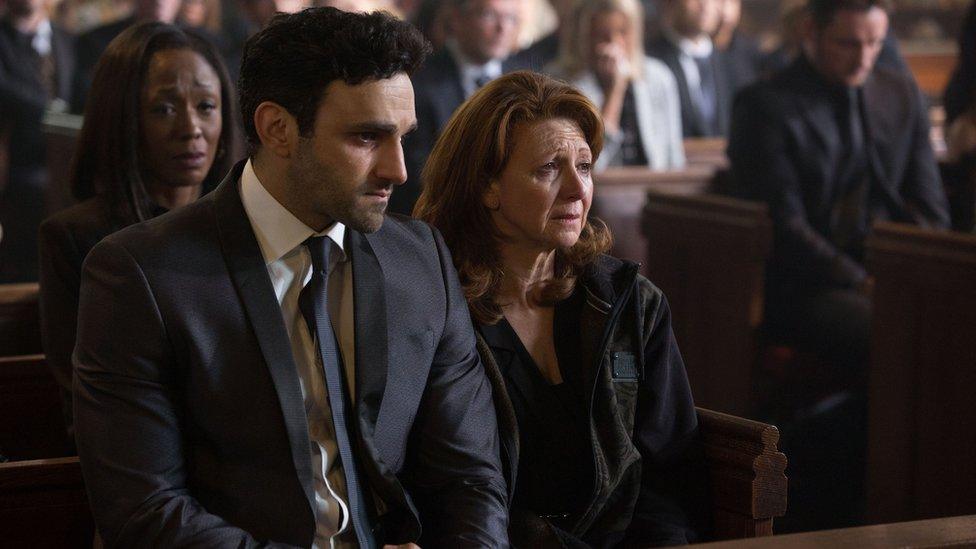
- Published22 May 2018
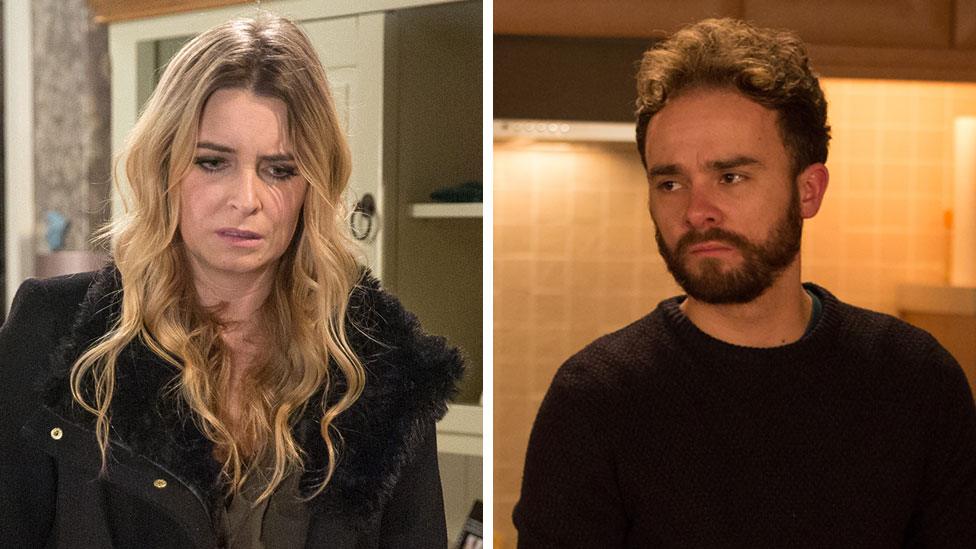
- Published10 May 2018
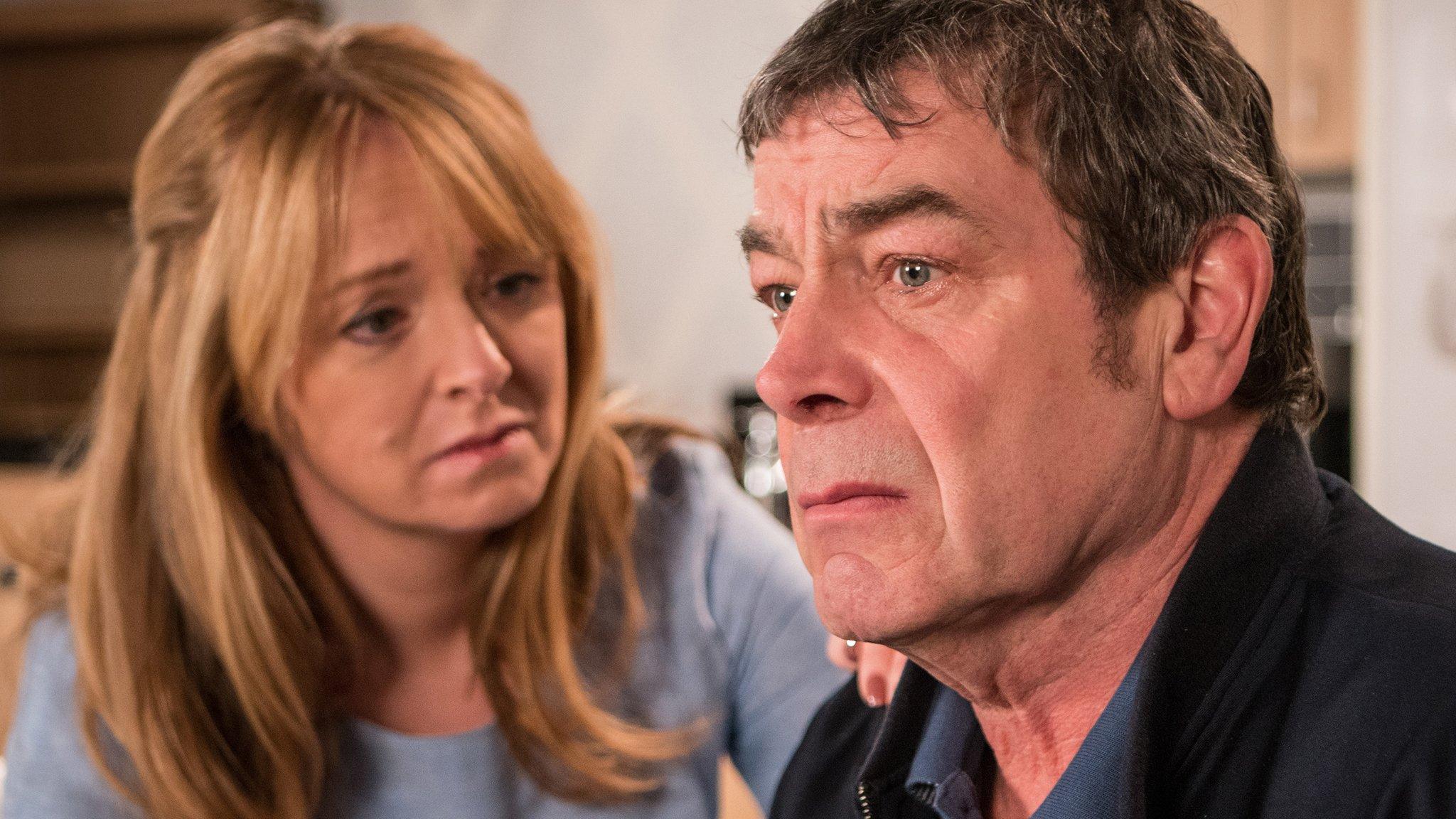
- Published22 March 2018
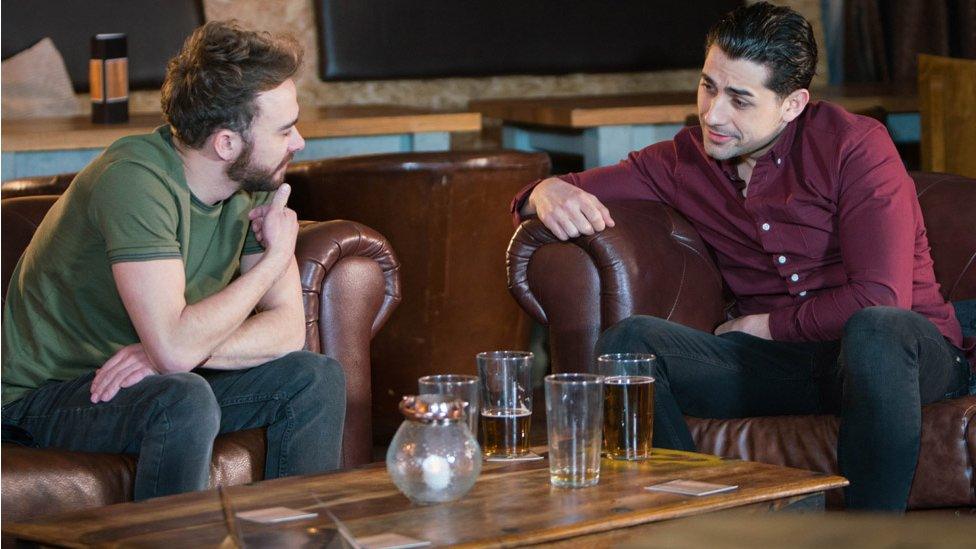
- Published5 April 2016
